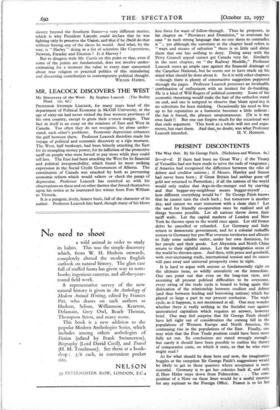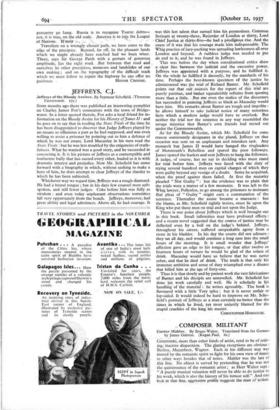PRESENT DISCONTENTS
The Way Out. By Sir George Paish. (Nicholson and Watson. 6s.)
IF—if—if. If there had been no Great War ; if the Treaty of Versailles had not been made to serve the ends of vengeance ; if America had recognised the difference between the roles of debtor and creditor nations ; if Messrs. Hawley and Smoot had never been born ; if Great Britain had neither gone-off gold nor returned to Protection ; if all the nations of the world would only realise that dogs-in-the-manger end by starving and that beggar-my-neighbour means beggar-myself . . . how different everything would be ! Sir George Paish knows that he cannot turn the clock back ; but tomorrow is another day, and cannot we start tomorrow with a clean slate ? Let the need for friendly co-operation once be realised and all things become possible. Let all nations throw down their tariff walls. Let the capital markets of London and New York be thrown open to the world once again. Let old frozen debts be cancelled or refunded. Let Germany and Italy return to democratic government, and let a colonial reshuffle restore to Germany her pre-War overseas territories and allocate to Italy some suitable outlet, under her own dominion, for her people and their goods. Let Abyssinia and North China return to their rightful status. Let the immigration areas of the world be thrown open. And then, with peace and goodwill, with ever-increasing trade, international tension and its causes will pass away and universal prosperity come in sight.
It is hard to argue with anyone so fundamentally right on the ultimate issue, so wildly unrealistic on the immediate. One can point out that even on the long-run view, and assuming all present political difficulties to be overcome, every swing of the trade cycle is bound to bring again that dislocation of the relationship between creditor and debtor (and thus between lending and borrowing nations) which has played so large a part in our present confusion. The trade cycle, as it happens, is not mentioned at all. One may wonder whether there is really nothing in the Socialist case against unrestricted capitalism which requires an answer, however brief. One may feel surprise that Sir George Paish should have left right out of consideration the coming fall in the populations of Western Europe and North America, the continuing rise in the populations of the East. Finally, one may wish that the Free Trade position could have been more fully set out. Its conclusions are stated strongly enough ; but surely it should have been possible to outline the theory of comparative costs, on which it rests, so that he who runs might read ?
As for what should be done here and now, the imagination boggles at the reception Sir George Paish's suggestions would be likely to get in those quarters where acceptance is most essential. Germany is to get her colonies back if, and only if, Herr Hitler steps down from Fiihrerdom. . . . The com- position of a Note on these lines would be a useful exercise for any aspirant to the Foreign Office. France is to let her peasantry go hang. Russia is to recognise Tsarist debts— not, it is true, on the old scale. America is to join the League of Nations.
Travellers on a wrongly chosen' path, we have come to the edge of the precipice. Beyond, far off, lie the pleasant lands which we might already have reached had we been wiser. There, says Sir George Paish with a gesture of generous, amplitude, lies the right road. -. But between that road and , ourselves lie other precipices, morasses and landslides of our- own making ; and on the topography of the difficult track which we must follow to regain the highway he can offer no































































 Previous page
Previous page